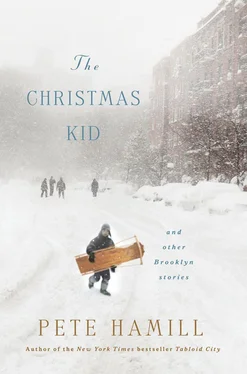Of course, it was technically a sin. She knew that. And yet Miss Flanagan believed in a merciful God: how could something so sweet, so tender, so human, be an offense against a just and merciful God? When her mother died, and her father lay sick and old for so many years, she had surrendered all hope of union with a man. She had sacrificed, denied herself, endured the long penance of loneliness. Did that mean she would go to her grave on the cama de piedra? Yes, she thought, I am a sinner, and I am now reduced to going to confession in different churches; but I am here, alive, on this earth, and I want Mr. Macias. Yo, sin tu amor, yo soy nada.
Then one morning, as she left for the hospital, she saw two men sitting in a blue Plymouth parked beside a fire hydrant. They seemed to be watching her, and Miss Flanagan was suddenly alarmed. She walked to the corner to take the bus, and looked back, and saw the blue Plymouth pull away. She stepped into a telephone booth and called her own number. Mr. Macias answered.
“There were two men in a car watching the house,” she said. “Do you think they were looking for you?”
He hesitated. “Why? Why would they look for me?”
“I–I don’t know,” she said. “I just thought—”
“Don’t worry. Please don’t worry.”
But all day at the hospital, she worried. And when she came home that night, and started to cook a meal, and realized swiftly that Mr. Macias was late, panic rushed through her. Suppose he never came back? Suppose he was afraid, scared of the police, an illegal alien who would be arrested and shipped home to Mexico? She tried to imagine the house with Mr. Macias gone, and she began to weep.
Then she heard the key turning in the gate beneath the stoop and the double doors opening, and when Mr. Macias entered, smiling, holding a large bunch of roses, she ran to him and wrapped her arms around him and held him to her generous breasts and thumping heart and wept some more.
A week later, at seven o’clock on a Friday morning, the doorbell rang. It was as she knew it would be. She pulled on a robe and walked along the parlor floor. Through the cut-glass inner doors, she could see the two men from the Plymouth. One was tall and blond, the other shorter, balding, smoking a cigarette. They each wore raincoats and bored expressions. She opened the door.
“Good morning,” the blond one said. He reached into his back pocket and took out his wallet and showed her a plastic card that bore his picture.
“We’re here to pick up a man named Macias,” the shorter one said, flipping his cigarette into the street.
“Can I help you?” she said, and smiled. “I’m Mrs. Macias.”
The Men in Black Raincoats
IT WAS CLOSE TO midnight on a Friday evening at Rattigan’s Bar and Grill. There were no ball games on the television, old movies only made the clientele feel more ancient, and the jukebox was still broken from the afternoon of Red Butera’s daughter’s wedding. So it was time for Brendan Malachy McCone to take center stage. He motioned for a fresh beer, put his right foot on the brass rail, breathed in deeply, and started to sing.
Oh, the Garden of Eden has vanished, they say,
But I know the lie of it still,
Just turn to the left at the Bridge of Finea,
And meet me halfway to Cootehill…
The song was very Irish, sly and funny, the choruses full of the names of long-forgotten places, and the regulars loved Brendan for his quick, jaunty singing of it. They loved the roguish glitter in his eyes, his energy, his good-natured boasting. He was, after all, a man in his fifties now, and yet here he was, still singing the bold songs of his youth. And on this night, as on so many nights, they joined him in the verses.
The baby’s a man now,
He’s toil-worn and tough,
Still, whispers come over the sea
Come back, Paddy Reilly, to Ballyjamesduff
Come home, Paddy Reilly, to me.
Outside, rain had begun to fall, a cold Brooklyn rain, driven by the wind off the harbor, and it made the noises and the singing and the laughter seem even better. Sardines and crackers joined the glasses on the bar while George, the bartender, filled the empties. And Brendan shifted from jauntiness to sorrow.
If you ever go across the sea to Ireland,
Then maybe at the closing of your day…
The mood of the regulars hushed now, as Brendan gave them the song as if it were a hymn. The bar was charged with the feeling they all had for Brendan, knowing that he had been an IRA man long ago, that he had left Ireland a step ahead of the British police, who wanted him for the killing of a British soldier in the Border Campaign. This was their Brendan: the Transit Authority clerk who had once stood in the doorways of Belfast, with the cloth cap pulled tight on his brow, the pistol deep in the pockets of his trench coat, ready to kill or to die for Ireland.
He was singing now about how the strangers came to Ireland, the bloody Brits, and tried to force their ways upon the Irish, his voice was a healthy baritone, a wealth of passion overwhelming a poverty of skill, and it touched all of them, making the younger ones imagine the streets of modern Belfast, where their cousins were still fighting, reminding the older ones of peat fires, black, creamy stout, buttermilk in the morning. The song was about a vanished time, before rock and roll and women’s liberation, before they took Latin out of the Mass, before the blacks and the Puerto Ricans had begun to move in and the children of the Irish had begun to move out. The neighborhood was changing, all right. But Brendan Malachy McCone was still with them, still in the neighborhood.
A little after midnight two strangers came in, dressed in black raincoats. They were wet with rain. They ordered whiskey. Brendan kept singing. Nobody noticed that his voice faltered on the last lines of “Galway Bay,” as he took the applause, glanced at the strangers, and again shifted the mood.
Oh, Mister Patrick McGinty,
An Irishman of note…
The strangers drank in silence.
At closing time the rain was still pelting down. Brendan stood in the open doorway of the bar with Charlie the Pole and Scotch Eddie, while George the bartender counted the receipts. Everyone else had gone home.
“We’ll have to make a run for it,” Charlie said.
“Dammit,” Scotch Eddie said.
“Yiz might as well run, cause yiz’ll drown anyway,” George said. He was finished counting and looked small and tired.
“I’ll see ya, gents,” Charlie said, and rushed into the rain, running lumpily down the darkened slope of 11th Street to his home. Eddie followed, cutting sharply to his left. But Brendan did not move. He had seen the strangers in the black raincoats, glanced at them in the mirror for a while as he moved through the songs, saw them leave an hour later. And now he was afraid.
He looked up and down the avenue. The street lamp scalloped a halo of light on the corner. Beyond the light there was nothing but the luminous darkness and the rain.
“Well, I’ve got to lock it up, Brendan.”
“Right, George. Good night.”
“God bless.”
Brendan hurried up the street, head down, lashed by the rain, eyes searching the interiors of parked cars. He saw nothing. The cars were locked. He looked up at the apartments and there were no lights anywhere and he knew the lights would be out at home, too, where Sarah and the kids would all be sleeping. Even the firehouse was dimly lit, its great red door closed, the firemen stretched out on their bunks in the upstairs loft.
Despite the drink and the rain, Brendan’s mouth was dry. Once he thought he saw something move in the darkness of an areaway and his stomach lifted and fell. But again it was nothing. Shadows. Imagination. Get hold of yourself, Brendan.
Читать дальше












